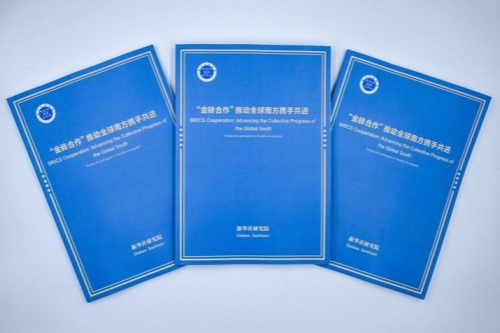
“金砖合作”推动全球南方携手共进文章源自英文巴士-https://www.en84.com/16186.html
BRICS Cooperation: Advancing the Collective Progress of the Global South文章源自英文巴士-https://www.en84.com/16186.html
文章源自英文巴士-https://www.en84.com/16186.html
新华社研究院文章源自英文巴士-https://www.en84.com/16186.html
Xinhua Institute文章源自英文巴士-https://www.en84.com/16186.html
文章源自英文巴士-https://www.en84.com/16186.html
目录文章源自英文巴士-https://www.en84.com/16186.html
Table of Contents文章源自英文巴士-https://www.en84.com/16186.html
文章源自英文巴士-https://www.en84.com/16186.html
序言文章源自英文巴士-https://www.en84.com/16186.html
Foreword
第一章 金砖合作:团结协作的成就与贡献
Chapter 1: BRICS Cooperation: Achievements and Contributions of Solidarity and Collaboration
一、和平金砖:构筑共同安全格局
I. Peaceful BRICS: Forging a Common Security Framework
二、创新金砖:科技驱动与产业升级
II. BRICS Innovation: Technology-Driven Industrial Advancement
三、绿色金砖:探索可持续发展路径
III. Green BRICS: Exploring Pathways to Sustainable Development
四、公正金砖:推动全球治理变革
IV. Just BRICS: Driving Global Governance Reform
五、人文金砖:文化交流与民心相通
V. People-to-People BRICS: Cultural Exchange and Mutual Understanding
第二章“大金砖合作”:高质量发展新机遇
Chapter 2: “Expanded BRICS Cooperation”: New Opportunities for High-Quality Development
一、扩员壮大:释放多重合作新动能
I. Expansion and Growth: Unlocking New Drivers for Cooperation
二、数字转型:打造智能经济新引擎
II. Digital Transformation: A New Engine for the Smart Economy
三、能源合作:构筑多元供给新优势
III. Energy Cooperation: Building New Advantages in Diversified Supply
四、区域联通:拓展互联互通新网络
IV. Regional Connectivity: Expanding New Networks for Interconnection
第三章 “金砖+”合作:汇聚全球南方磅礴力量
Chapter 3: “BRICS+” Unites the Mighty Strength of the Global South
一、多边合作推动公平正义
I. Multilateral Cooperation for Equity and Justice
二、聚焦发展实现共同繁荣
II. Development-Centered Approach for Shared Prosperity
三、共兴文明实现多元和谐
III. Shared Civilizational Prosperity for Pluralistic Harmony
结语
Conclusion
编写说明与致谢
Notes and Acknowledgments
序言
Foreword
2006年,巴西、俄罗斯、印度、中国外长举行金砖国家首次外长会晤,启动金砖国家合作序幕。2009年,金砖国家领导人在俄罗斯举行首次会晤,并逐步构建以领导人会晤为引领、以安全事务高级代表会议、外长会晤等部长级会议为支撑,在各类领域开展务实合作的多层次架构。随着金砖国家合作机制的影响持续提升,“金砖大家庭”也在逐步壮大。2011年,南非正式加入金砖国家;2024年,沙特阿拉伯、埃及、阿联酋、伊朗、埃塞俄比亚成为金砖国家正式成员;2025年1月,印度尼西亚成为金砖国家正式成员,形成“大金砖合作”格局。
In 2006, the foreign ministers of Brazil, Russia, India and China convened the first meeting, marking the beginning of BRICS cooperation. In 2009, the leaders of these countries convened their inaugural summit in Russia, gradually establishing a multi-tier framework for practical collaboration across various fields. This framework is anchored by leaders’ meetings and supported by ministerial-level engagements, including gatherings of high-level representatives on security and foreign ministers. As the influence of the BRICS cooperation mechanism continues to grow, the “BRICS family” has steadily expanded. In 2011, South Africa officially joined BRICS. In 2024, Saudi Arabia, Egypt, the United Arab Emirates, Iran and Ethiopia became full members, followed by Indonesia in January 2025, establishing an “Expanded BRICS Cooperation” framework.
作为新兴市场国家与发展中国家合作的典范,金砖国家合作机制自诞生以来,以互尊互谅、主权平等、团结民主、开放包容、深化合作、协商一致的金砖精神,超越地缘政治与意识形态差异,走出了一条团结协作、共谋发展的道路。从最初的经济对话平台,到如今涵盖政治、安全、经济、科技、人文等领域的综合性战略合作机制,金砖国家不仅成为全球南方国家群体性崛起的重要支柱,更推动全球治理体系向更加公平、公正、包容的方向变革演进。
As a model of collaboration among emerging markets and developing countries, the BRICS mechanism has, since its inception, adhered to the BRICS spirit of mutual respect and understanding, equality of sovereignty, solidarity and democracy, openness and inclusiveness, deepened cooperation, and consensus-based decision-making. It has transcended geopolitical and ideological differences, forging a path of unity, collaboration and joint development. Evolving from an initial platform for economic dialogue to a comprehensive strategic cooperation mechanism encompassing politics, security, economy, science and technology, and culture, BRICS has not only become a pivotal force in the collective rise of the Global South but also advanced global governance toward greater fairness, equity and inclusivity.
金砖国家自主选择发展道路,共同捍卫发展权利,携手迈向现代化,不仅为自身繁荣注入了强劲动力,也为全球南方国家实现共同发展提供了战略引领。扩员后的“大金砖合作”,以更广泛的代表性和更强的包容性,汇聚了来自亚洲、非洲、中东、拉美等地区的新兴力量。这一崭新格局赋予金砖合作高质量发展新动能,也为“全球南方”在国际舞台上发出更强声音奠定更加坚实的基础。
BRICS countries choose their development paths independently, jointly defend their right to development, and march in tandem toward modernization. This has not only fueled their prosperity but also provided strategic guidance for the Global South in achieving shared development. With broader representation and enhanced inclusiveness, the “Expanded BRICS Cooperation” unites emerging forces from Asia, Africa, the Middle East and Latin America. This new paradigm injects fresh momentum into high-quality BRICS collaboration, laying a stronger foundation for amplifying the voice of the Global South on the international stage.
金砖合作的成就,源于其对公平正义的坚定追求、对创新发展的不懈探索,以及对文明互鉴的深厚实践。金砖国家尊重各国历史与文化传统,支持“全球南方”国家走符合自身国情的现代化道路,打破了关于“现代化”模式的单一叙事,为全球文明的多元和谐贡献了智慧。在当前历史关头,面对全球化逆流、地缘政治热点与气候变化等挑战,金砖国家肩负着更大的责任与使命,应着力推进“大金砖合作”高质量发展,依托“金砖+”等平台,吸纳更多“全球南方”国家参与,促进“全球南方”团结合作,推动全球治理体系变革。作为“全球南方”国家的“第一方阵”,金砖国家将以金砖责任应对共同挑战,以金砖担当开创美好未来,引领“全球南方”国家共同驶向现代化的彼岸,共同书写人类历史新篇章。
BRICS achievements stem from its unwavering commitment to fairness and justice, relentless pursuit of innovation-led development, and the profound practice of mutual learning among civilizations. Respecting the historical and cultural traditions of all countries, BRICS supports Global South countries in pursuing paths to modernization suited to their national conditions, challenging monolithic narratives about development models and contributing wisdom to a harmonious diversity of global civilizations. At this critical juncture in history, amid challenges such as anti-globalization headwinds, geopolitical conflicts and climate change, BRICS countries shoulder greater responsibility and mission. They must advance high-quality “Expanded BRICS Cooperation,” leverage platforms like “BRICS Plus,” and engage more Global South countries to foster unity and collaboration to transform global governance. As the vanguard of the Global South, BRICS will confront shared challenges with a sense of responsibility, pioneer a brighter future, and steer Global South countries toward modernization, so as to jointly write a new chapter in human history.

